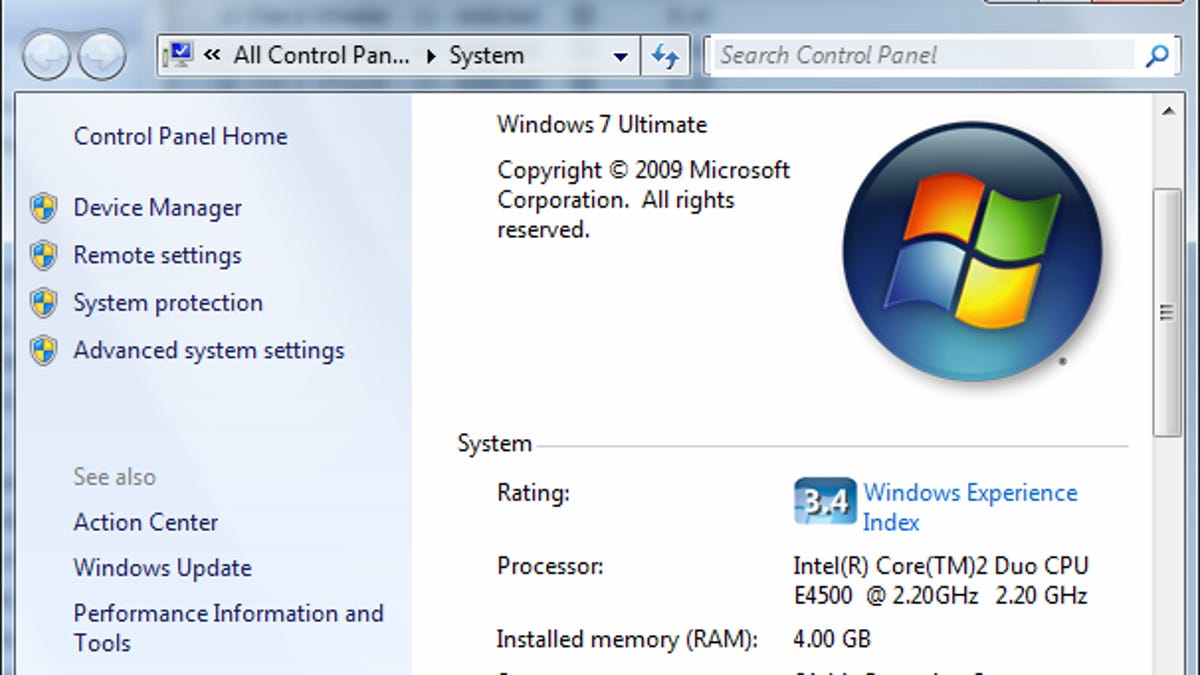Windows 7: 64-bit to go prime time
The transition to Windows 64-bit will go prime time with the release of Windows 7. Here are the compelling reasons to move to the 64-bit platform.

Consumers have had the option of 64-bit Windows computing since the release of Windows XP Professional x64 Edition in May 2005, four years after the release of Windows XP 32-bit. At the end of 2006, Windows Vista 32-bit and 64-bit versions were released simultaneously. Yet chances are you're currently using a machine that runs the 32-bit version of Windows.
This is about to change. Windows 64-bit has started to gain a significant foothold in the past two years as more systems ship with 3GB or more of memory. However, with Windows 7, 64-bit computing is likely to become even more common.
What's the difference between 32-bit and 64-bit computing? In a nutshell, the numbers refer to the amount of bits a computer can process in one computation. They also translate into the amount of random access memory (RAM) a computer can address. A 32-bit Windows computer can address a maximum of 4GB of RAM, while a 64-bit Windows machine can address up to 128GB and even more (64-bit applications can address theoretically up to 16 billion gigabytes of memory). So the higher number of bit means better computing, both in terms of precision and capability.
Despite the potential, the transition to the new platform has been slow. This is because of the high price of RAM and the lack of device drivers and 64-bit software applications. (Drivers are a special type of software that make hardware components work with the operating system. Without the sound driver, for example, your computer wouldn't be able to play music.)
Back when Windows Vista was released, 2GB of RAM, which is the recommended amount to make Vista run properly, could easily cost a couple hundred dollars. (This is one of the reasons Vista failed so badly as a new OS release.) There was virtually no 64-bit application then, either, other than a few game demos, and most hardware vendors didn't provide the 64-bit version of the drivers. Apart from this, 32-bit computers have been able to satisfy most of our daily computing needs.
It's been more than four years since then and things have changed a lot. Windows Vista, while it wasn't exactly celebrated, has helped make 64-bit drivers become more readily available. The fact that Windows 7 uses the same driver architecture as Vista will make it the most 64-bit-ready OS when it's officially released come October. On top of that RAM is now about four times more affordable than it used to be back in 2005.
(Currently, if you buy a computer from Dell or HP or any other vendors and choose to have 4GB of RAM or more, the computer will come with Windows Vista 64-bit.)
I just finished testing the 64-bit version of Windows 7 for the review of the OS and can confirm that most of the critical hardware components, including networking, sound, and video, now have 64-bit drivers ready. By the time Windows 7 is officially released, you'll probably have no problem finding 64-bit drivers for most components.
That said, despite the fact there are not yet many 64-bit applications, here are the compelling reasons to move to the 64-bit platform:
Larger memory: As RAM gets cheaper, new computers come with more RAM, and the only way to make this useful is to use a 64-bit version of Windows. It's safe to say all computers equipped with 4GB of RAM or more will be pre-installed with Windows 64-bit. In short, you might just get a Windows 64-bit computer whether you are aware of that. This is probably the main reason for the 64-bit platform to take off.
(RAM, or system memory, is the place where information is being processed. This is not to be confused with hard drive, the place where information is stored. The more RAM a computer has, the faster it can get things done.)
Backward compatibility: Most, if not all, 32-bit software applications (except for drivers) can operate in Windows 64-bit the way they do in Windows 32-bit. In other words, Windows 64-bit can run all what Windows 32-bit runs plus 64-bit applications.
Better experience: Together with the 64-bit Windows, Microsoft enforces the digital signature of the drivers. This means there will be less badly developed device drivers, which are one of the main causes of crashes. Also, 64-bit versions of software, especially games and graphics/multimedia programs, will offer much better overall performance.
However, there are still a couple of reasons to expect some hiccups during this transition. First off, drivers are still issues, as many legacy peripheral devices, such as printers or scanners, will never work with 64-bit Windows. Secondly, 16-bit software applications, those designed for Windows 3.1 or DOS, will not be supported anymore. Lastly, I personally have found out that codecs for many types of compressed video formats, such as MKV or DiVx, for now, are not working well with Windows 64-bit, especially with the Media Center application.
Also, we can't ignore the fact that as a 32-bit application can run on both platforms, developers are now still more enticed to make them than the 64-bit versions.
Nonetheless, together with Windows 7, the 64-bit platform will definitely be taking over desktops and high-performance laptops, leaving the 32-bit primarily for Netbooks and low-power, low-performance applications.
Apple is also moving in the same direction with the upcoming release of Snow Leopard, whose accompanying applications (including Finder, Mail, Safari, iCal, iChat, and so on) will be 64-bit.
If you have been using the 64-bit version of Windows, please share your experience in the comments section below.
Corrected at 2:10 p.m.: This story initially misstated when Windows Vista 32-bit and 64-bit versions were released. It was 2006.

